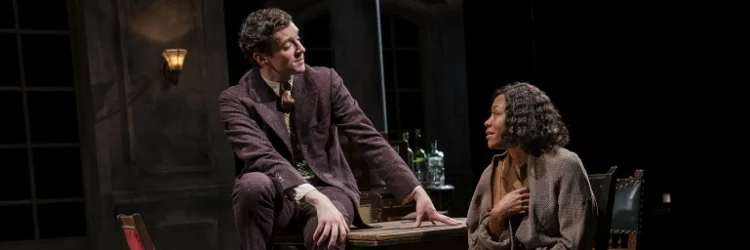Review of Tony Kushner's A Bright Room Called Day at the Public Theater
A Bright Room Called Day, now at the Public Theater, first breathed life back in 1985. We know this because playwright Tony Kushner appears as a character in the story about 10 minutes in and tells us. Mind you, he is not identified as Kushner. He is not named anywhere except the program. He is Xillah (Jonathan Hadary), and presents himself as the author in a quandary. This is the play he wrote 34 years ago. It never worked until Trump was elected - and now everyone wants to produce it, but it needs an upgrade. He brings with him another character Zillah (Crystal Lucas-Perry). While Xillah is located in our present, Zillah is located in the present of the writing of the original play - 1985. Xillah is playing fast and loose with time - but he can do that because he is the writer. The rest of us are merely along for the ride - and it will be a bumpy one.
The story covers the events in Berlin from January 1, 1932, to November 1933. Specifically, the exact months during which Hitler came into power, dismantling the German democracy, anointing himself supreme leader, and building the first concentration camp. Agnes Eggling (Nikki M. James) lives in the bright room of an apartment with her lover Vealtninc Husz (Michael Esper) and entertains her dearest friends Annabella Gotchling (Linda Emond), Paulinka Erdnuss (Grace Gummer) and Gregor Bazwald (Michael Urie). This coterie dabbles in political debate. Capitalism is failing. There is inflation and unemployment everywhere (in the U.S., the Depression was in full bloom). The choices seem to be Communism or Fascism. We, the audience, know where this is going. The people onstage do not.
The parallel of Germany's terrible decent and our own political cesspool are clear. Racism, homophobia, the disregard for protocol, betrayal of foreign allegiances, and the demand for loyalty - these are chilling and not lost on any of us. Kushner, however, insists on driving the points home using Xillah and Zillah's sidebar conversations. These are labeled "Interruptions" in the script and become the didactic portions of the play. So dense that they bring the show to a slow halt. Over and over again.
The story is clear enough. As Germany begins to crumble, we watch the safety net unravel, bit by bit. Political parties are outlawed. People are taken away never to be seen again. Food is scarce. The powers are closing in on anyone not toeing the line. The life options soon become either leave the country (find the holes in the borders) and end your life as you know it, or end your life - period. Agnes is frozen in place and tormented by her personal nightmare, the character of Die Älte (Estelle Parsons) who is part ghost, part menace, part prophesier. And let's not forget that short visit by the Devil (Mark Margolis). Agnes becomes the iconic person in the crowd who does not salute Hitler. She grips her purse with both hands and tries to wish the evil away. She cannot, however. She is brought down by the sheer weight of Hitler's regime whose appetite for power is insatiable. She is swallowed whole.
It is only in the final moments of the play that the past and the present merge. Agnes' spirit rises to the challenge and we finally see Kushner's intended destination. The scene is shattering. Would that we had arrived earlier.
(Photo by Joan Marcus)
WHAT THE OTHER CRITICS SAID
"Among those portraying semi-decadent, left-leaning Berliners waiting for that other jackboot to drop in the early 1930s are some of my favorite performers: Linda Emond, Michael Esper, Nikki M. James and Michael Urie. And in a cumbersome allegorical role called Die Älte is the great Estelle Parsons, 92, who gives a performance of such bravura ferocity that the production's fiery special effects seem pallid beside her... Yet these promisingly eccentric elements rarely cohere into any form that combats an inevitable numbness. In portraying people who debate themselves into a state of stasis — endlessly discussing philosophies of history and politics — Bright Room itself freezes into flamboyant paralysis."
Ben Brantley for New York Times
"Kushner gives us an almost daily, sometimes hourly, account of what happened in Germany from 1932 to 1933. Factoids about the Hitler's rise to power are projected on the upstage wall of David Rockwell's handsome apartment set. These statements of horrible political facts are simple and riveting. Some of the communist characters in Bright Room are not."
Robert Hofler for The Wrap
"Reviewing the new revival/revisal of Tony Kushner's 1985 play A Bright Room Called Day seems almost redundant. After all, the playwright does much of the heavy lifting himself, thanks to the periodic interruptions of two fourth wall-breaking characters who provide meta-theatrical commentary about the work even as we're watching. One of them, Zillah (Crystal Lucas-Perry), also appeared in the play's original version, as a woman from the then Reagan-era present day to provide contemporary commentary about the work set in 1932-33 Germany. The other is the unimaginatively named Xillah (Jonathan Hadary), who serves as a stand-in for Kushner himself. Judging by the lacerating comments of both figures, the playwright feels more than a little sheepish about this early effort."
Frank Scheck for Hollywood Reporter
Originally published on
